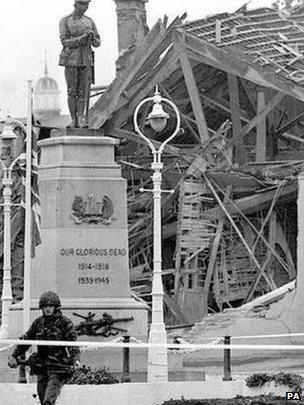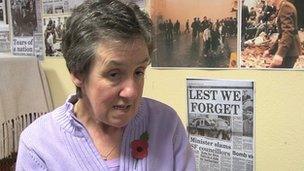Enniskillen survivors plea to McGuinness over attack
- Published

Eleven people died in the Enniskillen Poppy Day bombing and a 12th died after 13 years in a coma.
A "desecration" and "utterly barbaric" was how British prime minister Margaret Thatcher described the Enniskillen bombing.
Pledging to do everything possible to catch the killers, she said "there should be no hiding place in any country for these people."
The Irish government was equally strong in its condemnation. Irish prime minister Charles Haughey said those responsible "must be utterly repudiated and brought to justice."
But 25 years after the bombing, no-one has been convicted.
The Historical Enquiries Team, which reviews all unsolved murders during the Troubles, recently completed its investigation of the attack and passed a file to the PSNI's Serious Crime Branch. The HET does this if it believes there are realistic evidential opportunities that have not been pursued.
The families of the 11 people killed and the 63 who were injured hope the PSNI will launch a new investigation, but it could be months before a decision is reached.
One former officer with detailed knowledge of the investigation says he does not believe there will be a conviction unless someone with direct knowledge of the attack comes forward and provides information about who was responsible.
It has been claimed that Deputy First Minister Martin McGuinness could be in a position to provide such information.
Police sources say the IRA's Northern Command knew about plans for the Enniskillen bombing in advance and sanctioned it. It's claimed that Martin McGuinness was a member of Northern Command at the time. He has denied that was the case, and that he had any advance information about the attack.
It has also been claimed that shortly after the attack, Martin McGuinness visited members of the IRA unit responsible to ask what had gone wrong and why so many civilians had been killed. He previously told the BBC that if he did go to such a meeting, he did so in his capacity as a senior member of Sinn Fein.
Questioned about the bombing during the Irish presidential election campaign last year, Martin McGuinness denied he was a senior figure in the IRA and the time and said he felt "ashamed" by the attack.
Unionist politicians and relatives of those killed and injured have said the deputy first minister should demonstrate his shame by co-operating with any police investigation.

Daphne Stephenson was injured in the bombing, she believes many questions remain unanswered
Daphne Stephenson was one of those who was injured. She was buried beneath rubble when the bomb exploded and still has flashbacks about what happened. She told the BBC she believes the victims of Enniskillen have been forgotten and that many questions remain unanswered.
"There was millions spent on the Bloody Sunday inquiry, it seems there is justice for some parts of the community and not for others. Why isn't there any inquiry for us?" she said.
"We need to know why the police didn't search the reading rooms (where the bomb was planted) and we need to know what Martin McGuinness knows about this."
Libya
In a statement to the BBC, Sinn Fein said Martin McGuinness has said many times in the past that he knows nothing about the Enniskillen bomb.
The killings had huge repercussions for the IRA. In addition to public and political outrage at home and abroad, the bombing provoked heated debate within the IRA and Sinn Fein about future republican strategy. Many say that debate helped form the foundation for the peace process that eventually led to the IRA declaring a ceasefire and Sinn Fein taking seats at Stormont.
Libya, which had provided the IRA with tonnes of weapons, including the military explosive Semtex, also withdrew its support.
In a statement, Colonel Gaddafi's government said: " Libya is aware of the difference between legitimate revolutionary action and terrorism aimed at civilians and innocent people. This action does not belong to the legitimate revolutionary operation."
Shortly before the Enniskillen bombing, a ship called the Eksund was stopped at sea with a huge consignment of weapons being sent to the IRA by Libya. The cargo included Semtex, surface to air missiles and 1,000 AK47 assault rifles. It was believed to be one of a series of consignments. It was also the last as no further shipments were sent after the bombing.
The Historical Enquiries Team will not comment on what potential new lines of inquiry have been identified, but the BBC understands it may have been made aware of a potential new witness who could have information about what happened, and has not previously been interviewed by the police.
The team has reviewed around 1,700 killings during the Troubles and has referred just 31 files to the police, so the move is not normal practice.
It could be months before the police decide whether there are sufficient grounds for a new investigation.
Even if the PSNI decides to launch a new investigation, one former officer who is familiar with the original RUC investigation says he does not believe there will be convictions unless someone with direct knowledge of the attack comes forward and provides information about who was responsible.
The families of those who were killed and injured will clearly hope he is wrong.